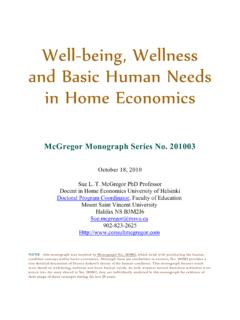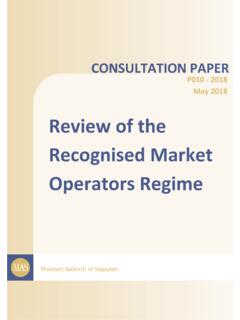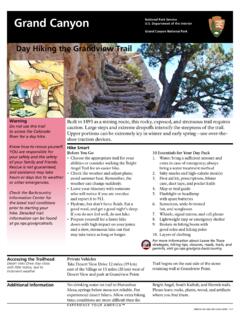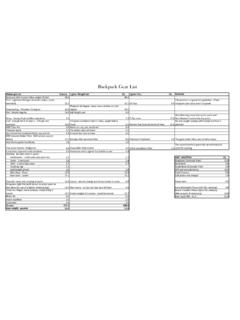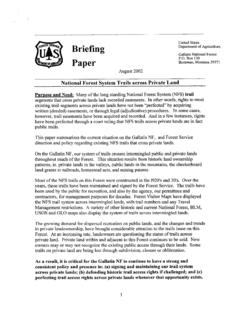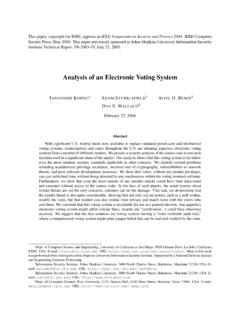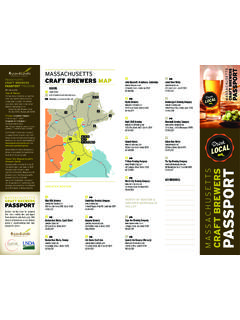Transcription of McGregor, S.L.T., & Murnane, J. A. (2010). Paradigm ...
1 McGregor, , & Murnane, J. A. (2010). Paradigm , methodology andmethod: intellectual integrity in consumer scholarship. International Journalof Consumer Studies, 34(4), 419-427. Posted with Permission from Wiley-BlackwellKeywords: consumer, methodology, positivism, post-positivism, empirical, interpretive,critical, paradigmAbstractThe intellectual integrity, trustworthiness and diversity of consumer scholarship dependson researchers accounting for the methodological (philosophical) underpinnings of their discussion is predicated on the assumption that many scholars do not clearly differentiatebetween methodology and method. To address this issue, the paper distinguishes between thesetwo concepts, identifies four axioms of methodologies, identifies and describes two overarchingresearch paradigms (positivism and post-positivism), contrasts quantitative/qualitative withpositivistic/post-positivistic, and positions consumer scholarship with three dominant researchmethodologies: scientific, interpretive and critical.
2 Suggestions are offered about what variousactors can do to better ensure responsible consumer scholarship through methodologicalaccountability. Knowingly or not, scholarship intended to generate new knowledge, in each of natural,social and human sciences, is informed by research paradigms. Within the academy, it iscommon knowledge that a Paradigm is a set of assumptions, concepts, values, and practices thatconstitutes a way of viewing reality for the community that shares them, especially in anintellectual discipline like consumer studies. Each Paradigm is accompanied with attendantmethodologies (assumptions about knowledge, values, reality and logic, to be discussed shortly).As a caveat, this paper is not about changing paradigms, the prevailing patterns of thought withina science or discipline (Kuhn, 1962); rather, it is about being conscious of which Paradigm andattendant methodologies are being applied when conducting and evaluating research.
3 To reiterate, a Paradigm is a set of assumptions, concepts, values, and practices thatconstitutes a way of viewing reality. Although the three main sciences accept this basic notion ofwhat constitutes a Paradigm , the actual Paradigm embraced by each science is often natural sciences tend to use the positivistic Paradigm and the human and social sciences tendto use the post-positivistic Paradigm , to be discussed shortly. However, what constitutes aparadigm does not change, nor does what constitutes a methodology. As well, the authors are not advocating any particular Paradigm . They are, instead,making the case that if people consciously self-identify with a respective Paradigm and properlyapply its methodological tenets and principles, they minimize the risk of relinquishing theirresponsibility to account for the philosophical underpinnings of their work, thereby enhancingthe integrity of consumer scholarship.
4 The rigour of the consumer studies discipline depends onscholars being able to address deep questions about the integrity of their work. The commonpractice of using the heading Methodology, but then describing the methods used in the researchdesign, is the stepping stone for introducing the main idea shared in this paper - the intellectualintegrity, trustworthiness and diversity of consumer scholarship depends on researchersaccounting for the methodological (philosophical) underpinnings of their work, not just themethods used to sample, collect and analyze data and report the versus MethodConsumer scholars often use the terms methodology and method interchangeably. Thispractice is unfortunate because they are not the same.
5 The former refers to philosophy and thelatter refers to technical procedures applied to conduct research. More significantly,methodologies shape the diversity of the entire body of knowledge. For example, if everyoneused just the scientific method (informed by the empirical methodology within the positivisticparadigm), all of the knowledge would be predicated on one methodology and worldview,significantly reducing the diversity of knowledge available to address consumer issues. The word methodology comprises two nouns: method and ology, which means a branchof knowledge; hence, methodology is a branch of knowledge that deals with the generalprinciples or axioms of the generation of new knowledge.
6 It refers to the rationale and thephilosophical assumptions that underlie any natural, social or human science study, whetherarticulated or not. Simply put, methodology refers to how each of logic, reality, values and whatcounts as knowledge inform research. On the other hand, methods are the techniques andprocedures followed to conduct research, and are determined by the methodology ( , sampling,data collection, data analysis and results reporting, as well as theories, conceptual frameworks,taxonomies and models). Even the focus and intent of the research, and the actual researchquestions themselves, are shaped by the methodology. The misuse of [the term] methodologyobscures an important conceptual distinction between the tools of scientific investigation(properly methods) and the principles that determine how such tools are deployed and interpreted(methodology) (American Heritage Dictionary, 2000, web citation).
7 Conceptual ClarificationThe authors realize that use of the terms Paradigm , methodology and method is incrediblymessy in the literature. In the spirit of conceptual clarification, we understand the term paradigmto encompass two dimensions: (a) philosophical, basic beliefs and assumption about the world;and, (b) technical, the methods and techniques adopted when conducting research. In this paper,we use the term Paradigm to refer to two overarching world-views or traditions shaping research:positivism and post-positivism. We appreciate that each of these two paradigms can bedistinguished by their philosophical underpinnings (called methodologies, with four attendantaxioms), which in turn inform the methods or techniques employed to conduct research withinthese paradigms.
8 Further, we recognize that methods are often characterized as either qualitative orquantitative (to be discussed), appreciating that a cadre of scholars equate quantitative withpositivism and qualitative with post-positivism. Recognizing the confusion caused by theinterchangeability of these terms, we committed ourselves to be consistent in their use as weunderstand them. To that end, we used Paradigm to refer to positivism and post-positivism,methodology to refer to empirical, interpretive and critical, and method to refer to approaches togathering and analyzing evidence and presenting results (see Appendix One). Usually anappendix infers optional reading; in this case, it should be read in order to gain a betterunderstanding of how each of Paradigm , methodology and methods are Methodological AxiomsThis next section addresses the philosophical underpinnings of research, explaining thefour axioms that differentiate one methodology from another.
9 This discussion is followed by ourunderstanding of the concepts of quantitative and qualitative. The paper then turns to anoverview of the fundamental differences between positivistic and post-positivistic research methodologies are differentiated by four axioms or principles (axiom is fromthe Greek axios, meaning to deem worthy ): (a) what counts (is worthy) as knowledge and howpeople come to know it (epistemology); (b) what counts as nature, reality, feeling, existence orbeing (ontology); (c) what is acceptable as rigour and inference in the development of arguments,judgements or insights (logic); and, (d) what counts as fundamental values and what isconsciousness (moral choices, ethics, and normative judgements) (axiology).
10 The latter axiom isespecially concerned with the role and voice of the researcher and the participants in the research(Ponterotto, 2005), see Appendix One. In more detail, can knowledge be discovered (is it out there waiting), must it beexperienced (created by and among individuals within their cultures), or is it grounded in powerand social practices? Is reality a given (external from people s consciousness), a product ofindividual and collective consciousness, or is it what people are living through, right now? Arehumans determined by their environment or do they create their environment (the nature ofreality)? What logic is acceptable for forming thoughts, conclusions, opinions, judgements,revelations and insights?

